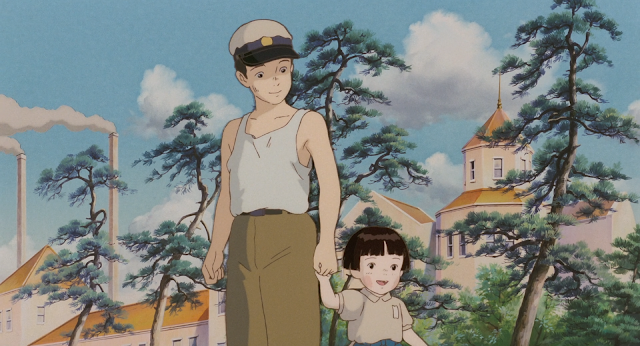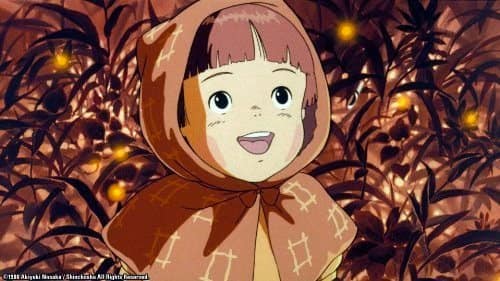 |
| The good times |
Grave Of The Fireflies.
Even typing it gives me goosebumps. And not good goosebumps. No these are the kind of goosebumps that accompany a pounding heart and a sick stomach. Grave is a stunning film. But it's the kind of stunning that will kick you in the stomach and leave you feeling like crawling into bed for a week after it. It's the kind of film that people who haven't even seen it shudder at the mention of its name.
 |
| Awe |
The stinger of Grave is letting us get to know and fall for our lead characters all the while knowing what exactly will happen to them. The film starts at the end and then flashes back to better times. We get to see some of the lightness and joy of their lives of course but this only makes what comes later even worse. It's excruciating stuff, you sit watching with a pain in your belly and a heavy heart knowing you just have to let the story play out agonisingly and knowing that there is nothing you can do to stop it. Well apart from pressing stop. Seita and Setsuko are real breathing fully developed characters, not ciphers, meaning you care for them and dread the future. Brave Seita and lovely little Setsuko. Setsuko, the heart of the film. Seeing her suffer will catch in your throat and seeing Seita in pain at her suffering will lay you out.
 |
| The bad times. |
There's no glorification of battle in this. No fetishisation of the military machine. The US army is nearly an abstract enemy. We never see them in person and only barely glimpse the planes, instead hearing them and seeing the waste they have laid bare. This film could have been set in any war tbh, it wouldn't have changed its message. No glory, only carnage. At times we see the Japanese people turning on each other, becoming as bad as any enemy. War dehumanises people, turns them hollow and selfish. The kind of selfish that allows an adult to turn a blind eye to the suffering of children.
Imagine the terror, the fear, the loss of it all. And then the real pain starts, the hunger, the loneliness, the utter helplessness. It's nearly unthinkable right. Now imagine you are a child, on your own, no parents, everything you do is a struggle to survive. That's this film. It's the truth of war.
If you haven't seen it I'm very envious of you. I know i've made it sound like a horrible slog but it's a film that needs to be seen. We need to remember that this story is still happening today, be it in the Sudan or Syria or Afghanistan. It's one of the most powerful films you'll ever see, animated or otherwise. A haunting, moving masterpiece.
Note - if you do decide to watch this, do watch it in it's original language with English subtitles. The dubbed version takes so much away from the film.

1 comment:
Saw it once, in the IFI years ago. Its superb but i could never sit thorugh it again. It's too much for me.
Post a Comment